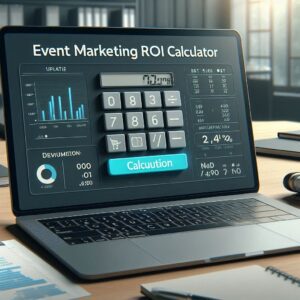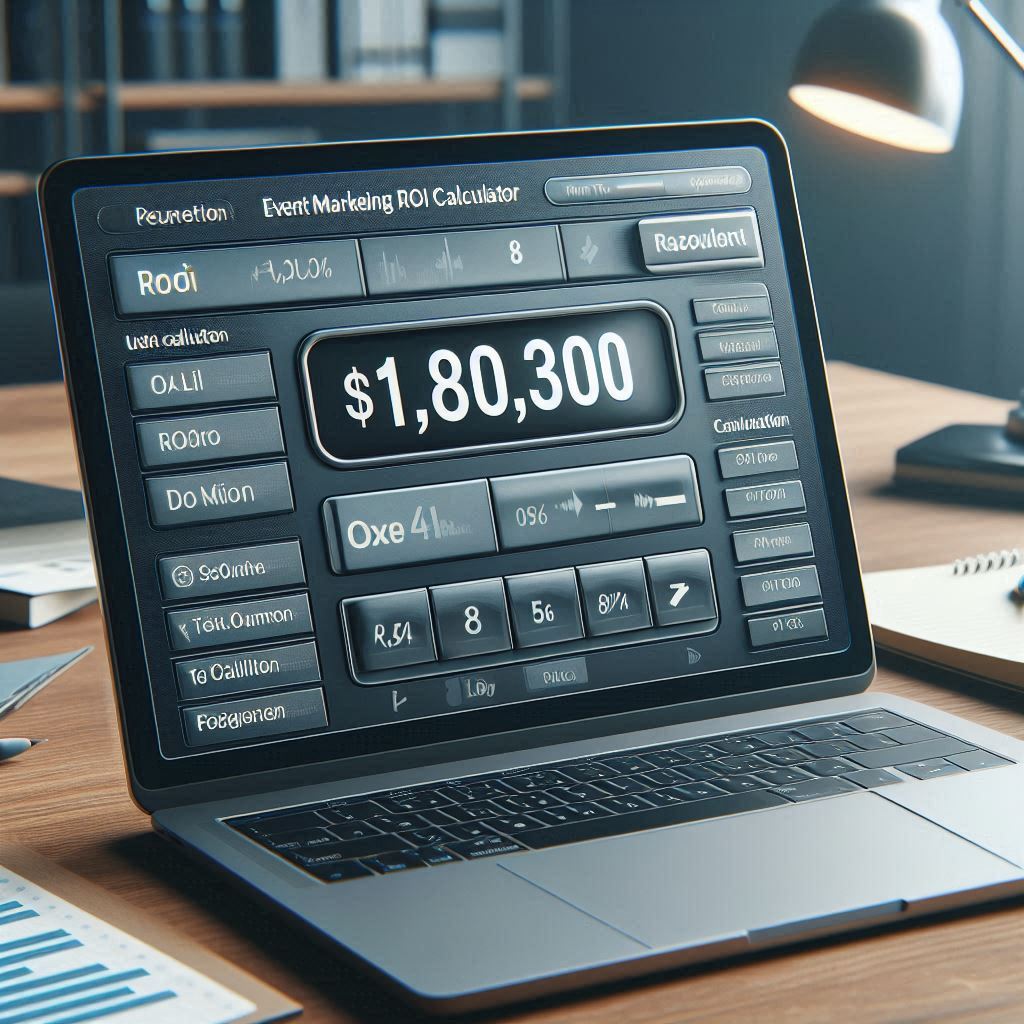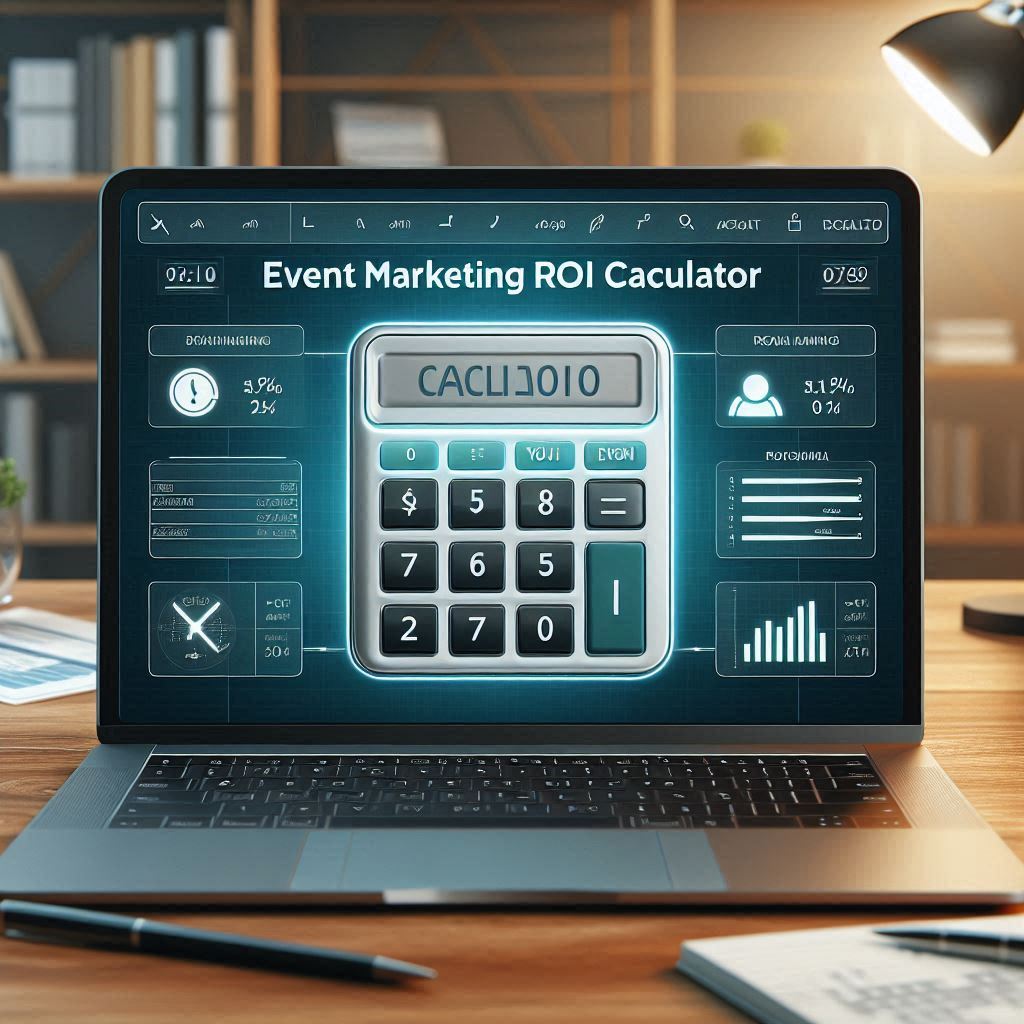Event Marketing ROI Calculator
Result:
Introduction to the

Ever wondered how effective your event marketing efforts really are? The Event Marketing ROI Calculator is designed to help businesses and marketers quantify the return on investment from events. Whether you’re hosting a conference, trade show, or webinar, this tool provides insights into how much revenue your event generates compared to the costs involved. For companies looking to optimize marketing budgets, understanding the return on investment (ROI) is crucial. Did you know that 52% of event marketers say that ROI is the most important metric when measuring event success? This calculator simplifies that process.
What is the Event Marketing ROI Calculator?

The Event Marketing ROI Calculator is a tool that measures the profitability of your event-related marketing efforts. By comparing the revenue generated from an event to the costs involved, the calculator provides a clear percentage indicating whether your event was financially successful. ROI, or Return on Investment, is a widely recognized metric used in various business sectors to assess the performance of an investment. Here, it focuses on events, helping you see if the investment in planning, promoting, and executing an event paid off.
Importance of the Event Marketing ROI Calculator in Various Contexts

Why is tracking your event marketing ROI so important? In today’s competitive business landscape, every dollar spent on marketing needs to be accounted for. Events are often high-cost investments, and the ability to measure their effectiveness helps businesses fine-tune their strategies. For example, event marketers in the tech industry often track ROI to ensure that expensive product launches generate sufficient interest and sales. In the real estate sector, companies use ROI metrics to assess whether property exhibitions lead to closed deals. No matter the field, using an ROI calculator can lead to better, data-driven decisions.
Understanding the Event Marketing ROI Calculator Formula

The Event Marketing ROI Calculator typically uses the following formula:
ROI (%) = [(Revenue – Cost of Event) / Cost of Event] x 100
- Revenue: The total revenue generated as a direct result of the event (e.g., product sales, leads converted to customers).
- Cost of Event: All associated expenses, including venue rental, marketing, speaker fees, travel, and logistics.
For instance, if an event generates $50,000 in revenue and costs $25,000 to organize, the ROI would be:
ROI (%) = [($50,000 – $25,000) / $25,000] x 100 = 100%
This means the event earned double the investment. It’s essential to adapt the formula depending on specific factors, like tracking long-term customer value rather than just immediate sales.
Types of Event Marketing ROI Calculators
There are several variations of the Event Marketing ROI Calculator, depending on the time frame and complexity of the calculation:
- Simple ROI Calculator: Focuses on total event costs versus immediate revenue.
- Monthly ROI Calculator: Measures ROI on a month-to-month basis to track ongoing marketing efforts.
- Annualized ROI Calculator: Adjusts the ROI for events that influence longer-term financial gains, offering a more holistic view of impact.
How to Use the Event Marketing ROI Calculator
Using the Event Marketing ROI Calculator is simple. Here’s a step-by-step guide:
- Input Event Costs: Enter all costs associated with the event (venue, marketing, staff, etc.).
- Input Event Revenue: Enter the total revenue or sales directly attributed to the event.
- Calculate ROI: Press “Calculate” to get your event’s ROI percentage.
For example, let’s assume your total event cost is $30,000, and you generate $60,000 in sales from the event. The calculator will show that your ROI is 100%, indicating that your investment has doubled.
Factors Affecting Event Marketing ROI
Several factors can influence the accuracy of your event marketing ROI calculation:
- Market Conditions: Changes in consumer demand or competition can impact event performance.
- Time Frame: Some events generate immediate returns, while others may take time (e.g., lead nurturing).
- Audience Engagement: The quality of engagement, such as follow-ups and customer retention, affects the overall ROI.
Understanding these variables helps you make more informed predictions and adjustments.
Common Misconceptions About Event Marketing ROI
Many people assume that a high turnout automatically leads to a high ROI, but this is a misconception. The focus should be on the quality of leads or sales generated, not just the number of attendees. Another myth is that event ROI can only be calculated for sales-driven events. In reality, non-sales events like brand awareness campaigns or networking functions can also generate significant ROI in terms of long-term customer relationships.
Examples of Event Marketing ROI Applications
Here are some scenarios where the Event Marketing ROI Calculator can be applied:
- Tech Conferences: A company hosts a tech conference to launch a new product, measuring how many attendees convert to paying customers.
- Real Estate Expos: Real estate companies assess whether their participation in an industry expo leads to property sales.
- Webinars for Software Firms: A software company evaluates the ROI of hosting a webinar based on how many attendees signed up for a paid subscription afterward.
Frequently Asked Questions (FAQs)
- What is ROI in event marketing?
ROI is the return on investment generated from the total costs and revenue associated with an event. - How is event ROI calculated?
ROI is calculated by subtracting the event costs from the revenue, then dividing by the event costs and multiplying by 100. - Can I use the ROI calculator for non-sales events?
Yes, it can be used for brand awareness or lead generation campaigns as well. - What costs should I include in the calculation?
Include all direct and indirect event costs such as marketing, staffing, logistics, and venue expenses. - Why is my ROI negative?
A negative ROI indicates that the event generated less revenue than it cost, resulting in a loss. - Can I calculate long-term ROI?
Yes, you can track ROI over time, especially if the event’s impact continues after its conclusion. - Do I need to include follow-up marketing in the costs?
Yes, follow-up campaigns should be included to get a true picture of total expenses. - What’s the difference between ROI and ROO (Return on Objectives)?
ROI focuses on financial return, while ROO measures non-monetary goals like brand awareness. - Can I calculate ROI for free events?
Yes, by tracking indirect revenue like future sales or leads generated. - How often should I measure event ROI?
Measure ROI after each event, and periodically review long-term returns from past events.
Conclusion
Measuring event marketing ROI is essential for making informed business decisions and maximizing future event success. With the Event Marketing ROI Calculator, you gain insights into whether your event delivered the results you aimed for. Try the tool today and see how you can improve your event strategies for better profitability.